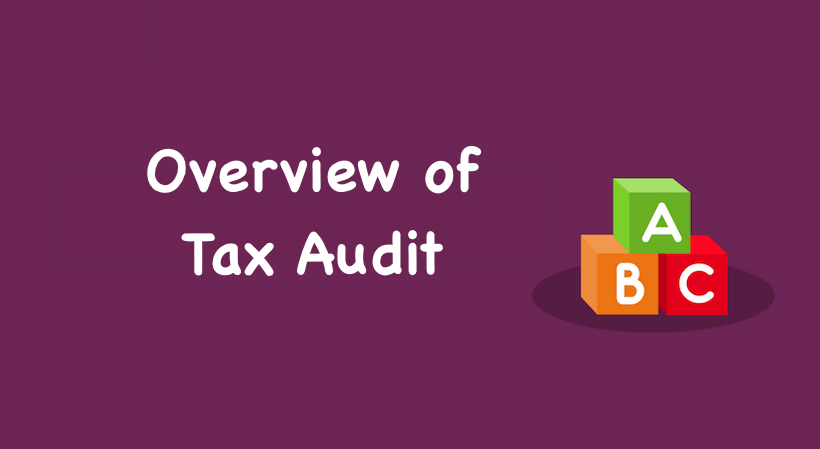Overview of Tax Audit: In recent years, significant changes have been made in Form No. 3CD. Insertion of new clauses in recent years such as clause 17 related to transfer of land, building or both, changes in clause 21(b) in respect of amounts inadmissible under section 40(a), clause 33 which requires section-wise details of deductions admissible under Chapter III, clause 34 related to tax deduction at sources has significantly enhanced reporting responsibilities of assessee and tax auditor in respect of information submitted in Form No. 3CD.
Further, introduction of Income Computation and Disclosure Standards (ICDS) and applicability of Ind AS to certain class of assessees requires more comprehensive disclosures in financial statements and Form No. 3CD. By virtue of provision of section 44AB of Income-tax Act, 1961, tax auditor has responsibility to ensure factual accuracy of information furnished in Form No. 3CD as tax authorities rely on information provided in Form No 3CD while computing taxable income of the assessee. check more details for Overview of Tax Audit from below…
Overview of Tax Audit
Section 44AB of Income-tax Act, 1961 (hereinafter referred to ‘Act’) makes it obligatory for a person carrying on business to get his accounts audited by an accountant, and to furnish by the ‘specified date’, the report in the prescribed form of such audit, if the total sales, turnover or gross receipts in business in the relevant previous year exceed or exceeds Rs 1 Crore. For a professional, the provisions of tax audit become applicable, if his gross receipts in profession exceeds Rs 50 lakhs in the relevant previous year. The scope of section 44AB also provides that audit under the section would be required in case of a person carrying on
- (i) business of the nature referred to in sections 44AE, 44BB and 44BBB, where he claims his income to be lower than the deemed presumptive income under the respective section.
- (ii) business of the nature referred to in section 44AD, if the provisions of section 44AD(4) are applicable in his case and his income exceeds the basic exemption limit.
- (iii) profession of the nature referred to in section 44ADA, where he claims his income to be lower than the deemed presumptive income under that section and his income exceeds the basic exemption limit.
In case of an assessee with higher turnover/gross receipts of upto Rs 2 crore, opting for presumptive taxation under section 44AD, tax audit is not required.
The compulsory tax audit is intended to ensure proper maintenance of books of account and other records, in order to reflect the taxable income of the taxpayer and to facilitate the administration of tax laws by a proper presentation of the accounts before the tax authorities. This also saves the time of the Assessing Officers considerably in carrying out the assessment.
Section 44AB read with Explanation below sub-section (2) of section 288 stipulates that only Chartered Accountants should perform the tax audit. This section does not stipulate that only the statutory auditor appointed under the Companies Act or other similar Statute should perform the tax audit. As such, tax audit can be conducted either by the statutory auditor or by any other chartered accountant in full-time practice.
The compulsory tax audit is intended to ensure proper maintenance of books of account and other records, in order to reflect the taxable income of the tax payer and to facilitate the administration of tax laws by a proper presentation of the accounts before the tax authorities. This also saves the time of the Assessing Officers considerably in carrying out the assessment.
The vires of section 44AB has been upheld by Hon’ble Supreme Court in T.D. Venkata Rao v. Union of India [1999] 237 ITR 315 (SC). The Apex Court has made the following significant observations:
“Chartered Accountants, by reason of their training have special aptitude in the matter of audits. It is reasonable that they, who form a class by themselves, should be required to audit the accounts of businesses whose income (sic: turnover) exceeds Rs 40 lakhs* and professionals whose income (sic: gross receipts) exceeds Rs10 lakhs** in any given year. There is no material on record and indeed in our view, there cannot be that an income-tax practitioner has the same expertise as chartered accountants in the matter of accounts. For the same reasons the challenge under article 19 must fail, and it must be pointed out that these income tax practitioners are still entitled to be authorised representatives of assessees.”
- *(increased to Rs. One Crore w.e.f. A.Y. 2013-14)
- **(increased to Rs. Fifty Lakhs w.e.f. A.Y. 2017-18)
In view of above, responsibilities have been cast under the Act upon Chartered Accountants to perform the tax audit because of their effective practical training, professional skills, knowledge and expertise to perform the required audit procedures.
Section 44AB requires the tax auditor to submit the audit report in the prescribed form and setting forth the prescribed particulars. Sub-rule (1) of Rule 6G provides that the report of audit of accounts of a person required to be furnished under section 44AB shall
(a) in the case of a person who carries on business or profession and who is required by or under any other law to get his accounts audited, be in Form No 3CA;
(b) in the case of a person who carries on business or profession, but not being a person referred to in clause (a), in Form No. 3CB. Sub-rule (2) of Rule 6G further provides that the particulars which are required to be furnished under section 44AB shall be in Form No. 3CD. The requirements of Form No. 3CA or Form No. 3CB, as applicable relating to particulars in Form No. 3CD is that the auditor should report that these particulars in Form No 3CD are “true and correct”. Therefore, the tax auditor has responsibility to ensure factual accuracy of the information reported in Form No. 3CD.
Must Read –
